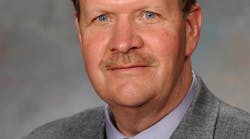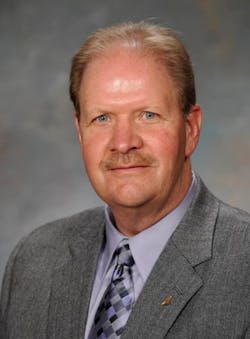WORCESTER, MASS. — William J. “Mac” Lynch will take over as president of the Mechanical Contractors Association of America at the group’s convention in Orlando, Fla., the third week in March. Lynch is president of the William F. Lynch Co. Inc., one of the most prominent, successful, and financially sound contractors in eastern Massachusetts. With more than 90 years of experience in the mechanical contracting field, the firm’s Worcester, Mass.-based facilities have grown to include its main office building, a pipe fabrication shop, computerized sheet metal fabrication building, and a storage facility.
Lynch became president-elect of MCAA last year at the association’s convention in Hawaii. Appointed to the Board of Directors in 2003, Lynch is active in the association on both the national and local levels. At the national level, he serves on the Executive Committee and the Board of Directors. He is a past chairman of the Advanced Leadership Institute Committee and a past member of the Safety & Health Committee. And, he is a graduate of MCAA’s prestigious Advanced Leadership Institute.
At the local level, Lynch served as president of the New England Mechanical Contractors Association and the New England Mechanical Service Contractors Association. The company is also a Star-Qualified member of the Mechanical Service Contractors of America.
“Mac” was willing to share some of the things he’s learned over the years with CONTRACTOR’s readers — things such as maybe you really were better off losing that job that you thought you wanted.
CONTRACTOR: The William F. Lynch Co. is an old-line firm. When did you know that you’d want to work for the family business? How did you get your start?
“MAC” LYNCH: While I was growing up, our company was expanding, and I was afforded the opportunity to work after school and on weekends for a few hours helping clean the shop, restock fittings, take inventory and help out during our move to a larger facility in the mid-sixties.
C: What was your first job? How did you get into the industry?
ML: My first formal job was working during the summers at a seacoast complex at Hampton Beach in New Hampshire. At about the same time I started working part-time in the family business during the fall, winter and spring seasons. Working in the business early on inspired me to study mechanical engineering at Northeastern University in Boston. After graduating, I obtained licenses as a Professional Engineer, Master Plumber and Master Pipefitter in Massachusetts.
C: What did you learn from your first boss?
ML: I learned that the more you’re willing to learn new skills and take on new tasks, the more valuable you become to your company. This applies not only between an employer and employee but also transcends to the contractors and owners that hire our company for various projects.
C: Do you have offspring in the business? Is there a succession plan in place?
ML: I have two sons working in our business. Both graduated from Northeastern University in Boston and did their co-ops with engineering firms in the Boston area. Brian is the oldest and worked an additional three years with his co-op employer before joining our company. Scott joined us immediately after graduating. They have worked as project managers, estimators, and are involved with taking CAD department from 3D towards BIM. Scott is also working with our seasoned plumbers and fitters to develop our prefabrication shop. Both are assets to the company as they are technologically advanced and are helping to educate our office staff to use our standard and new hardware and software more efficiently. Eventually they will be running the business jointly based on their particular strengths.
C: Tell me about the Worcester area and your region in eastern Massachusetts. How does being located in the Northeast influence your market?
ML: It’s been hard to find work in my area of the country, but we have good long-term clients that have kept us going. These include high-tech companies, insurance companies, hospitals, and schools where we have been involved with lab renovations and science buildings. We also are doing energy retrofits with high-tech and institutional projects. I believe these are likely the same fields that will continue to provide most of the work until businesses have the confidence to fund private projects. One private market that has shown some growth as the economy recovers is multifamily housing.
C: How does your firm’s work break out between the construction and service sides? How important is being MSCA Star Qualified for your business?
ML: We are and have always been more involved in the construction side of the business but we have slowly been able to increase the service side of our business from under 5% to 12% of our volume. Our construction division is a split by about 30% plumbing and 70% HVAC.
Being Star Qualified allows us to communicate to our customers and prospective customers the knowledge and training our technicians have and the standards our company follows; these factors help us to tune our customers’ equipment to the maximum efficiency, make recommendations based on our techs’ knowledge and lower their operating costs.
C: What do you most enjoy about running your company?
ML: I like everything about being in the business from designing to building the projects to meeting new people whether they are new clients or new employees. I think the majority of us that choose to enter the construction industry derive this satisfaction of seeing a successful project though to its completion.
C: Are you involved in green plumbing or sustainable construction? What are you telling your customers about saving water and energy? What are you hearing back from your customers? Are the coming green codes and standards from ASHRAE, ICC and IAPMO having an impact on your business?
ML: The majority of the green and sustainable construction projects we see at this point are driven by paybacks and ROI, so we try to emphasize those points with our customers. A good amount of the ROI is supplemented by rebates by utilities or by tax incentives; hopefully these programs will continue and additional incentives will be forthcoming to move these projects forward thereby reducing our nation’s dependence on foreign energy.
HVAC energy projects typically offer a greater return than those that focus on water conservation — at least in our region — so the majority of green projects focus on the energy side due to larger paybacks.
With the growing scarcity of clean water, it is imperative that the water conservation projects become the norm on a national scale regardless of the payback. The public and the business owners need to be educated on these issues and an appeal made to their consciences to implement these types of projects. Whether this is done by the trade press, op-ed pieces in newspapers and magazines, or educating our contractors, government officials and the public on the importance of water conservation, something has to happen to get these projects off the ground.
C: After all your years in the business, what are the most important one or two things that you have learned?
ML: There have been several higher profile projects over the years that we have fought hard for and lost. Most times in retrospect, losing these projects has been better for our company than getting them. The demands these projects have on time and resources usually prevent a company from pursuing smaller, more profitable projects.
C: What do you want your kids to know about this business?
ML: This has been a great business and still affords opportunities to be successful. Historically, this industry has been one of the slowest to adapt to new technologies and changes in our markets. We need to keep informed and decide how we will adapt to these changes to remain competitive in a more competitive market and to meet our customers’ needs.
C: What is the biggest problem facing contractors in the Northeast? What are you hearing from members as being the biggest problem for contractors nationwide?
ML: Nationwide, I foresee BIM and spatial coordination, compressed schedules, and contractors not being prepared for a recovery as the industry’s three biggest obstacles in 2012. Let me explain further.
The decision makers on construction projects are allowing less time from final approval by their financial advisors until the end of said projects, and as a result, the design phase of the project is often compromised. Ascontractors we all too often face incomplete design, tight or unrealistic schedules and an expectation that we should further lower our pricing.
Our industry has been touting BIM for several years now and the owners are listening; they believe that it will lead to lower costs, fewer change orders and shorter construction schedules. Although this may be correct if BIM is used properly, many owners or CMs have failed to add the time at the beginning of a project for the A/E firms to properly design and the MEP trades to coordinate and take advantage of the time savings afforded by prefabrication.
I also believe that as conditions improve and more work is contracted, many contractors may have cut back too much, not taken the time to improve their work processes and might be unable to meet these expectations of the owners.
C: How important is political action to MCAA?
ML: Political action is the cornerstone of MCAA’s wide-ranging advocacy efforts, which in 2011 included the development of a successful collaborative solution to [the Financial Accounting Standards Board’s] proposed reporting requirements and the rescinding of the 3% withholding tax on government contract payments.
In 2012, MCAA’s sights are once again set on ways in which it can protect members’ interests — and their bottom lines. To that end, we are participating in forums considering the scope and detail of narrow Pension Protection Act changes or more general multiemployer pension reforms that may come before Congress in 2013. Work also continues in coalitions promoting green building policy incentives, high performance building tax incentives and industrial facility energy efficiency incentives.
C: If you could accomplish just one goal this year as president for either the association or its members, what would that be?
ML: Improving educational opportunities for our members has always been one of my goals while serving on our local New England MCA Education and Career Development Committees. It is one of the best opportunities for return on investment of our members’ dues and MCAA has, in my mind, the best offerings out there. We have opportunities that include the Institute for Project Management, the Advanced Institute for Project Management, the Advanced Leadership Institute, our National Education Initiative, our education sessions at our Annual Convention, our various conferences throughout the year, and free webinars both live and recorded for our members.
As union contractors we plan to continue our joint strategic planning initiative with the United Association. We have made great progress this past year and a half by presenting the contractor’s business model to local union business managers and by presenting the issues facing business managers on a daily basis to our local MCA execs. We will continue to work together to become more competitive and regain market share.
Finally, we plan to continue the excellent job we have done in government relations and continue to keep watch on onerous laws and regulations. These for the most part just prevent our businesses from running efficiently and usually add great costs for compliance.
So I would summarize by saying that we need to continue to enhance our educational offerings, build on our relationship with our union partners and continue our diligence on what is happening in Washington and doing what is required to prevent over-regulating our industry.



